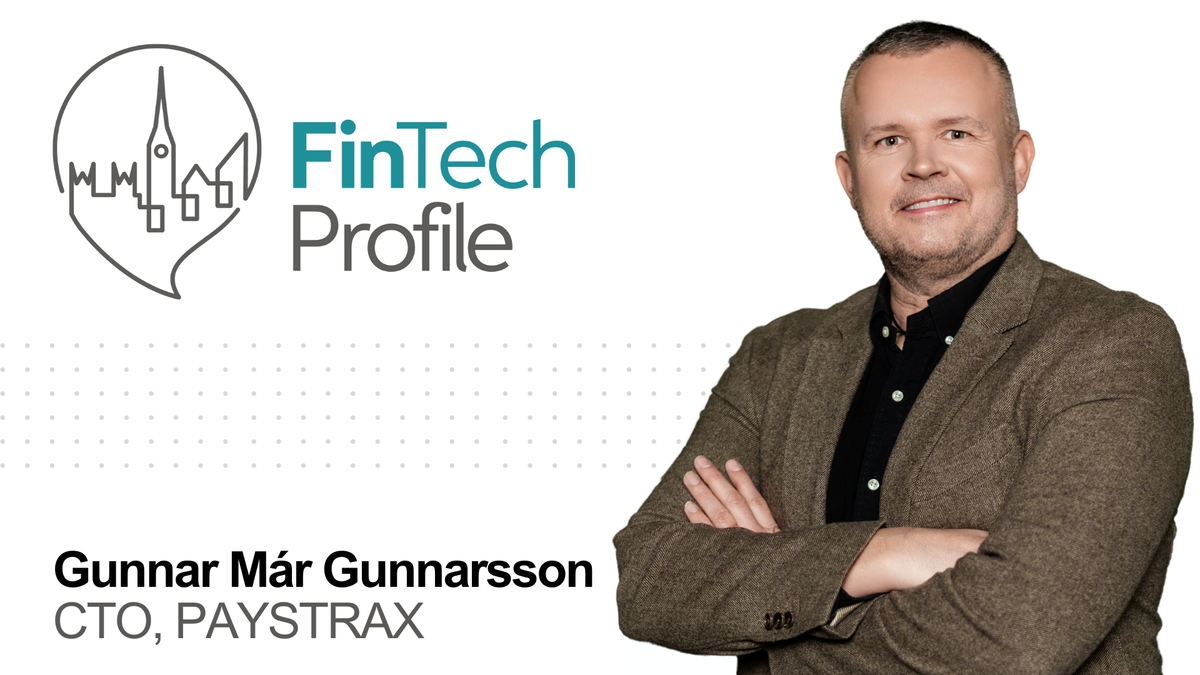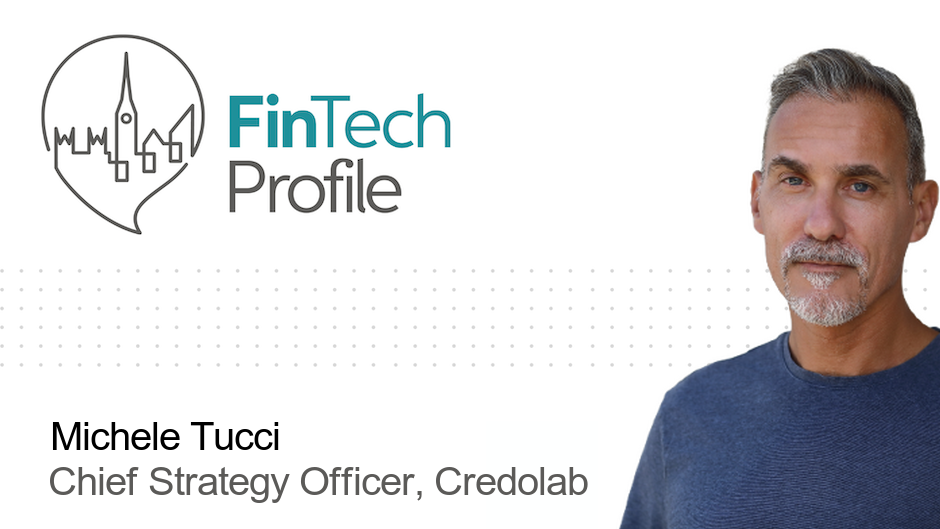Gunnar Már Gunnarsson, CTO, PAYSTRAX

Today we're meeting Gunnar Már Gunnarsson, CTO of PAYSTRAX. They are a fast-growing FinTech company specialising in card payment solutions for merchants across Europe and the UK.
Over to you Gunnar - my questions are in bold:
Who are you and what's your background?
I'm Icelandic and a second-generation FinTech entrepreneur—you could say payments run in my blood. My father, Gunnar Baeringsson, was one of the pioneers of FinTech in Iceland, co-founding Kreditkort hf. in 1980 to introduce the country's first credit cards. At the time, banks weren't issuing them, so this was a bold move that reshaped Iceland's financial landscape. The first cards issued were Eurocard, later Mastercard, and today, the company is known as SaltPay.
I've been immersed in the payments world since I was 10 years old, learning the ropes early on. After graduating from university, I transitioned into the IT side of payments, where I've spent my career working across different markets. In the 90s, I worked in the Czech Republic as a developer and consultant for Czechoslovenska Obchodni Banka, focusing on their VISA and Mastercard acquiring and issuing. Later, back in Iceland, I helped develop various Point of Sale and eCommerce solutions before co-founding KORTA PAY, a local PSP that we scaled into a full-fledged acquirer with in-house VISA and Mastercard capabilities.
After leaving KORTA PAY, I co-founded PAYSTRAX, where I now serve as CTO and a member of the Board. My journey has been driven by a passion for innovation in payments, and I've always been fascinated by how technology can transform financial services.
What is your job title and what are your general responsibilities?
As CTO, I'm responsible for defining and executing the technology strategy at PAYSTRAX, ensuring it aligns seamlessly with our business goals. My primary focus is on building scalable, secure, and high-performance systems that not only support growth but also deliver the best possible experience for our customers. Having been the architect of most of our technical environment, my role has evolved to scaling the team, delegating responsibilities, mentoring talent, and ensuring we always work with best-in-class technology.
With AI transforming financial services, I'm particularly focused on integrating AI-driven automation into our processes—enhancing decision-making, risk management, and operational efficiency. The way I see it, businesses that fail to embrace AI will quickly find themselves at a disadvantage. Beyond innovation, I also prioritise making sure our technology remains compliant, resilient, and adaptable in an ever-evolving regulatory landscape.
As PAYSTRAX continues to scale, my mission is to ensure we match the agility and innovation of industry leaders while maintaining our strengths as a specialised, high-performance payment provider.
Can you give us an overview of your business?
PAYSTRAX is a fast-growing FinTech company specialising in card payment solutions for merchants across Europe and the UK. As an acquirer and payment service provider, we play a crucial role in the payments value chain, offering comprehensive solutions designed for businesses operating in the digital economy. Our diverse customer portfolio spans both e-commerce and POS terminal merchants, positioning us as a dynamic force in an ever-evolving industry.
Beyond traditional VISA and MasterCard transactions, we offer seamless integration with Google Pay, Apple Pay, and American Express, ensuring our merchants can meet the demands of today's consumers. Our commitment to innovation is reflected in our strategic partnerships with leading e-commerce platforms, helping businesses stay ahead of changing payment preferences.
With headquarters in Vilnius and additional offices in Klaipeda, Reykjavik, and Brighton, UK, we are expanding our global reach while strengthening our presence in key markets. By combining cutting-edge technology with a deep understanding of merchant needs, we are redefining payment solutions for the modern business landscape.
Tell us how you are funded?
Unlike many FinTechs that rely on series funding and capital injection rounds, PAYSTRAX was built on a different philosophy—one we call the "make money first, then spend money" strategy. From day one, we focused on generating revenue organically rather than seeking external investment, allowing us to maintain full control over our direction and decisions.
And it's paid off, PAYSTRAX broke even just six months after going live and has been cashflow positive ever since. In 2022, we generated over €20 million in annual gross revenue, growing to €29.6 million in 2023—a 47% increase.
We don't position ourselves as 'game-changers' or 'cutting-edge innovators.' Our focus is simple: delivering highly efficient, scalable payment technology that makes life easier for merchants and retailers. Our own growth is secondary to keeping our customers happy—because without them, we wouldn't be here.
What's the origin story? Why did you start the company? To solve what problems?
Having spent years running a payment card acquirer with fully in-house developed systems, we recognised a gap in the market—an opportunity to build something even more efficient, scalable, and future-proof. Rather than relying on legacy infrastructure, we set out to create a new acquirer that harnesses the latest financial technologies to drive real value.
Our hands-on experience gave us a clear view of what adds real impact in payments—and what doesn't. This perspective shaped our approach, allowing us to develop a streamlined, cloud-based infrastructure designed for efficiency, flexibility, and long-term scalability.
At PAYSTRAX, our goal isn't just to operate profitably (though we remain one of the few organically profitable FinTechs in Europe); it's to redefine what merchants should expect from a payment partner. Through our Visa and Mastercard acquiring services and broader financial solutions, we're setting new benchmarks for reliability, performance, and customer-centric innovation.
Who are your target customers? What's your revenue model?
We are focusing our customer portfolio on including both e-commerce and POS terminal merchants, enabling us to serve a diverse range of clients. This approach positions us as a dynamic player in the European and UK payment landscape.
In total, our online payment solutions are designed for digital businesses, offering a comprehensive approach that meets the demands of the modern economy.
By developing a diverse customer portfolio that includes both e-commerce and POS terminal merchants, we effectively serve a wide range of clients, establishing ourselves as a dynamic force in the European and UK payment landscape.
If you had a magic wand, what one thing would you change in the banking and/or FinTech sector?
Standardised low-level protocols in the payment industry are severely lacking. Despite the push for Open Banking, the landscape has become even more fragmented, making system integrations increasingly complex. Payments remain highly inconsistent across vendors and schemes, often requiring multiple, redundant integrations that slow down innovation and add unnecessary costs.
Compare this to mobile connectivity—your phone works seamlessly across networks worldwide. Yet in payments, each provider and scheme demands a unique integration, creating inefficiencies and limiting scalability. The industry must move toward true standardisation to simplify adoption, enhance interoperability, and drive the next wave of innovation in global payments.
With a magic wand, this problem disappears, and suddenly, businesses compete on value-added services rather than wrestling with low-level integrations.
What is your message for the larger players in the Financial Services marketplace?
If the big players keep doing what they're doing in the payment space right now, eventually their customers will onboard newer, more innovative players in the market. Staying ahead of the pack means constantly evolving, something which the younger, more agile FinTechs have at their advantage. Innovation is a continuous journey with no real finishing line, and the customer has to always be put first if financial institutions are to secure long-term retention and growth.
Where do you get your Financial Services/FinTech industry news from?
Can you list 3 people you rate from the FinTech and/or Financial Services sector that we should be following on LinkedIn, and why?
I don't follow specific people, but recommend Sam Boboev, who runs Fintech Wrap Up.
What FinTech services (and/or apps) do you personally use?
- Saxo. Convenient, easy to use and feature rich.
- Revolut, account opening was easy, transfers are a breeze, and it has nice features.
What's the best new FinTech product or service you've seen recently?
Revolut X, a snappy crypto exchange, is conveniently linked to Revolut.
Finally, let's talk predictions. What trends do you think are going to define the next few years in the FinTech sector?
With the increasing regulatory burden on FinTechs in the EU, it is likely that adoption of new services will lag behind other regions, pushing innovators to focus on more favorable markets. In contrast, I believe that the UK is taking action and is likely to be ahead of the EU in innovation, creating a more dynamic environment for financial technology growth.
The adoption of AI will be the key differentiator among top players in the coming years. Integrating AI into customer onboarding, compliance, risk management, and portfolio management will be essential for Financial Technology companies to remain competitive. Given the growing compliance demands, this will be the era of Regulatory Technology, which must rely heavily on AI to keep pace.
Additionally, I believe Decentralised Finance (DeFi) will gain further traction, with blockchain applications expanding across multiple sectors, including lending, virtual assets, and real-world asset management. The shift towards digital and decentralised solutions will continue to redefine financial services globally.
Thank you very much, Gunnar!
Read more about Gunnar Már Gunnarsson on LinkedIn and find out more about his company at PAYSTRAX.com.




